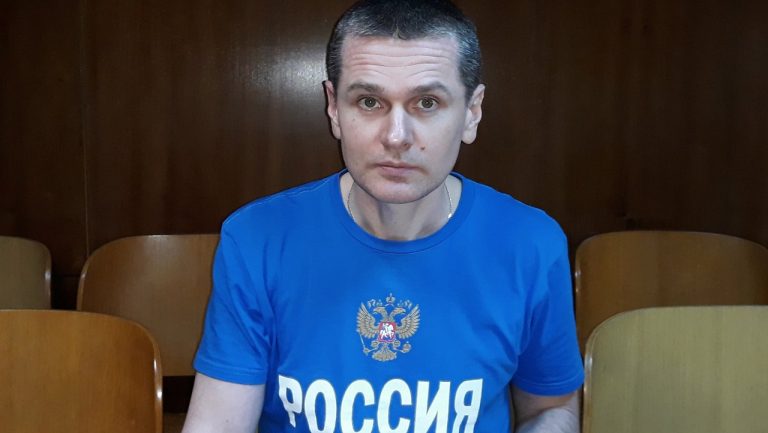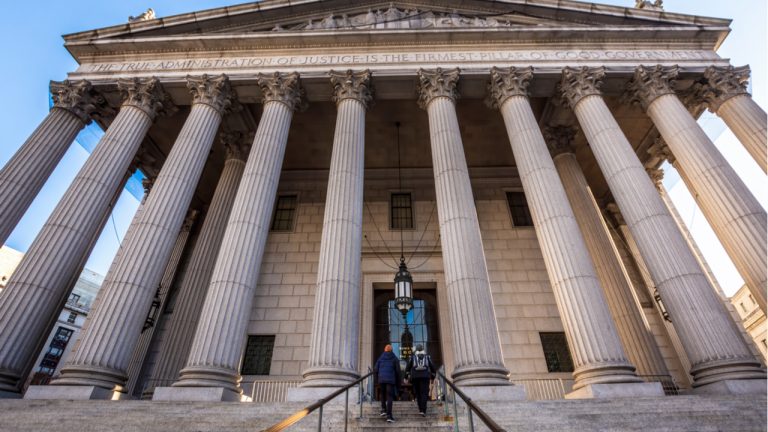 Sam Bankman-Fried (SBF), the disgraced co-founder of FTX, faces four more charges after a new indictment was unsealed on Wednesday. The charges include operating an unlicensed money transfer business and conspiring to commit bank fraud. SBF Gets 4 New Charges Tacked Onto His Indictment The former CEO of FTX was originally indicted 72 days ago […]
Sam Bankman-Fried (SBF), the disgraced co-founder of FTX, faces four more charges after a new indictment was unsealed on Wednesday. The charges include operating an unlicensed money transfer business and conspiring to commit bank fraud. SBF Gets 4 New Charges Tacked Onto His Indictment The former CEO of FTX was originally indicted 72 days ago […]
According to the Department of Justice, Forsage employed smart contracts which were coded in ways consistent with a Ponzi scheme.
The founders behind the alleged $340 million “global Ponzi” scheme Forsage have been indicted by a federal grand jury in the District of Oregon.
The four Russian founders — Vladimir Okhotnikov, Olena Oblamska, Mikhail Sergeev, and Sergey Maslakov — have been formally accused of having key roles in the scheme which raised approximately $340 million from victim-investors, according to a Feb. 22 Department of Justice (DOJ) statement.
“Today’s indictment is the result of a rigorous investigation that spent months piecing together the systematic theft of hundreds of millions of dollars,” said U.S. Attorney Natalie Wight for the District of Oregon, adding:
“Bringing charges against foreign actors who used new technology to commit fraud in an emerging financial market is a complicated endeavor only possible with the full and complete coordination of multiple law enforcement agencies.”
Forsage had touted itself as a low-risk decentralized finance (DeFi) platform built on the Ethereum (ETH) blockchain which purportedly allowed users to generate long-term passive income, Blockchain analytics however reportedly revealed that 80% of Forsage “investors” have received less back than they had put in.
According to the DOJ, analysis of the smart contracts revealed that funds raised as new investors purchased “slots” in Forsage’s smart contracts were diverted to older investors, as is consistent with a "Ponzi scheme."
Forsage still has an active Twitter account, which posted a thread on Feb. 22 claiming that community members who participate in “The Ambassador Program” would be able to earn monthly rewards by completing certain tasks.
2/3
— FORSAGE (@forsageofficial) February 22, 2023
Pre-registration will open soon, so don't hesitate to be among the first!
The Ambassador Program is an opportunity not only to earn rewards, but also to attract new members to the team, get to know the products better and broaden your horizons in the world of Web3.
On Aug. 1 2022, the Securities and Exchange Commission (SEC) had charged the four founders and seven promoters with fraud and selling unregistered securities, with acting chief of the SEC’s Crypto Assets and Cyber Unit, Carolyn Welshhans, noting at the time:
“Fraudsters cannot circumvent the federal securities laws by focusing their schemes on smart contracts and blockchains.”
The Philippines Securities and Exchange Commission had also flagged Forsage as a likely Ponzi back in 2020, but a month later the platform was still the second-most popular DApp on the Ethereum blockchain.
Related: Crypto, forex platform CEO pleads guilty to $248M fraud scheme
While a charge refers to the instance when a prosecutor brings criminal charges and accuses an individual or group of an offense, an indictment is filed by a grand jury if prosecutors are able to convince a majority of them that a formal accusation is warranted following an investigation.
Grand juries are common in federal and serious state felony offenses.
 Another member of Sam Bankman-Fried’s inner circle allegedly plans to plead guilty to criminal charges for his role in the alleged fraud that occurred at the cryptocurrency exchange FTX. According to unnamed sources familiar with the matter, Nishad Singh, FTX’s former director of engineering, is attempting to negotiate a deal with New York prosecutors. Sources […]
Another member of Sam Bankman-Fried’s inner circle allegedly plans to plead guilty to criminal charges for his role in the alleged fraud that occurred at the cryptocurrency exchange FTX. According to unnamed sources familiar with the matter, Nishad Singh, FTX’s former director of engineering, is attempting to negotiate a deal with New York prosecutors. Sources […] Before FTX collapsed it was assumed that Alameda Research was one of the top quantitative trading firms and market makers within the industry. However, much of that perception may have been a facade as a recent report details that Alameda suffered from financial troubles as early as 2018. People familiar with the matter said Alameda […]
Before FTX collapsed it was assumed that Alameda Research was one of the top quantitative trading firms and market makers within the industry. However, much of that perception may have been a facade as a recent report details that Alameda suffered from financial troubles as early as 2018. People familiar with the matter said Alameda […]
Various creators and promotors of two allegedly fraudulent crypto companies are facing a litany of charges that could land them 20 years in jail.
United States prosecutors have laid charges in two separate cases against nine people who founded or promoted a pair of cryptocurrency companies alleged to be Ponzi schemes that netted $8.4 million from investors.
On Dec. 14 the U.S. Attorney’s Office for the Southern District of New York unsealed the indictment, alleging the purported crypto mining and trading companies IcomTech and Forcount promised investors “guaranteed daily returns” that could double their investment in six months.
In reality, prosecutors say both firms were using the money from later investors to pay earlier investors, while other funds were spent on promoting the companies and buying luxury items and real estate.
“Lavish expos” were held in the U.S. and abroad, along with presentations in small communities, that lured investors in with promises of financial freedom and wealth.
Promotors would allegedly show up at events in expensive cars, wearing luxury clothing and would boast about the money they were making from investing in the company they were promoting. Investors were given access to a “portal” to monitor their returns
IcomTech and Forcount started to fall apart when users were unable to withdraw their purported returns.
Charges brought against Forcount’s creators and promotors by the Securities and Exchange Commission (SEC) allege the outfit targeted primarily Spanish speakers and gathered over $8.4 million from “hundreds” of investors selling “memberships” offering a cut of its crypto trading and mining activities.
In an attempt to spin up liquidity both companies created tokens so they could try repay investors with IcomTech and Forcount launching “Icoms” and “Mindexcoin” respectively.
Seemingly the token sales failed as by 2021 both had stopped making payments to investors.
“With these two indictments, this Office is sending a message to all cryptocurrency scammers: We are coming for you,” said U.S. Attorney Damian Williams. "Stealing is stealing, even when dressed up in the jargon of cryptocurrency.”
Related: Cryptocurrency has become a playground for fraudsters
David Carmona of Queens, New York was named in the indictment as the founder of IcomTech, and was charged with conspiracy to commit wire fraud that carries a maximum penalty of 20 years prison.
Forcount’s founder was named as Francisley da Silva, from Curitiba, Brazil and faces charges of wire fraud, wire fraud conspiracy and money laundering conspiracy which carries a maximum of 60 years in prison if convicted of all charges.
The promotors for the firms face various charges relating to wire fraud, wire fraud and money laundering conspiracy and making false statements.
 The Lazarus group, a North Korean hacking organization previously linked to criminal activity, has been connected to a new attack scheme to breach systems and steal cryptocurrency from third parties. The campaign, which uses a modified version of an already existing malware product called Applejeus, uses a crypto site and even documents to gain access […]
The Lazarus group, a North Korean hacking organization previously linked to criminal activity, has been connected to a new attack scheme to breach systems and steal cryptocurrency from third parties. The campaign, which uses a modified version of an already existing malware product called Applejeus, uses a crypto site and even documents to gain access […] A group of Russian and Venezuelan nationals have been charged by U.S. authorities for their roles in a scheme to circumvent Western sanctions and launder money on a global scale. They have been accused of obtaining military technologies from American companies, smuggling oil, and disguising money flows for Russian oligarchs through shell companies and crypto […]
A group of Russian and Venezuelan nationals have been charged by U.S. authorities for their roles in a scheme to circumvent Western sanctions and launder money on a global scale. They have been accused of obtaining military technologies from American companies, smuggling oil, and disguising money flows for Russian oligarchs through shell companies and crypto […] Alexander Vinnik, the alleged owner and operator of the infamous cryptocurrency exchange BTC-e, has been found not eligible for release on bail in the United States, where he was recently transferred from Greece. The Russian, accused of large-scale money laundering through the now-defunct trading platform, and other crimes, rejects U.S. charges. Alexander Vinnik Remains in […]
Alexander Vinnik, the alleged owner and operator of the infamous cryptocurrency exchange BTC-e, has been found not eligible for release on bail in the United States, where he was recently transferred from Greece. The Russian, accused of large-scale money laundering through the now-defunct trading platform, and other crimes, rejects U.S. charges. Alexander Vinnik Remains in […] Members of the team of the now defunct Turkish crypto exchange Thodex may receive thousands of years in prison, if the court backs the prosecutor’s plea in the case. The trading platform’s CEO has been missing for the past year since Thodex suspended activities in a suspected exit scam. Turkey Seeks up to 40,000 Years […]
Members of the team of the now defunct Turkish crypto exchange Thodex may receive thousands of years in prison, if the court backs the prosecutor’s plea in the case. The trading platform’s CEO has been missing for the past year since Thodex suspended activities in a suspected exit scam. Turkey Seeks up to 40,000 Years […] The legal tussle between the U.S. authorities and John McAfee continues as his associate Jimmy Watson has entered a plea. The former antivirus tycoon’s bodyguard has pleaded not guilty to the alleged cryptocurrency fraud case. McAfee and Watson Jr. Are Accused of Having Built a ‘Pump and Dump’ Scheme According to court documents, Jimmy Gale […]
The legal tussle between the U.S. authorities and John McAfee continues as his associate Jimmy Watson has entered a plea. The former antivirus tycoon’s bodyguard has pleaded not guilty to the alleged cryptocurrency fraud case. McAfee and Watson Jr. Are Accused of Having Built a ‘Pump and Dump’ Scheme According to court documents, Jimmy Gale […]